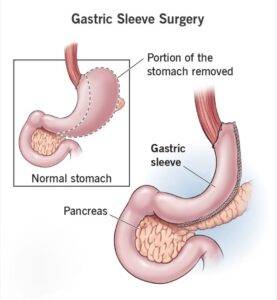What is Gastric Sleeve Surgery?
Choosing to have weight loss surgery, also known as bariatric surgery, isn’t an easy decision. Weight loss surgery is usually only considered if you are unable to achieve healthy weight loss through exercise and diet.
Gastric Sleeve Surgery is currently the most popular weight loss operation in the world and induces rapid and significant weight loss, which usually kick-starts your healthy lifestyle.
Laparoscopic Sleeve Gastrectomy, also called the sleeve, involves removing approximately 80% of the stomach.
By following the post-operative recommendations, patients can expect to lose approximately 1-2 kilograms per week until their body weight reaches a healthy range. Most people lose up to 70% of their excess weight.
Limiting the size of your stomach restricts the amount of food you are able to consume. In addition, the procedure prompts hormonal changes that assist with weight loss. These same hormonal changes also help relieve conditions associated with being overweight, such as high blood pressure or heart disease.
Procedure Details
A gastric sleeve involves removing a part of your stomach. The reason for calling this operation is that during the process, a narrow sleeve is created, and the larger part of the stomach (the curved part) is removed.

What remains is a banana-shaped portion, which is about 20% of your stomach.
Due to a reduction in ghrelin, a hormone that affects appetite, patients are also less likely to feel hungry between meals.
This procedure works by several mechanisms. It restricts the amount of food the stomach can hold – the new stomach pouch holds a considerably smaller volume than the normal stomach and helps to significantly reduce the amount of food (and thus calories) that can be consumed.
The greater impact, however, seems to be the effect the surgery has on gut hormones like Ghrelin, the hunger hormone, which favorably suppresses hunger, reduces appetite, improves satiety, and improves blood sugar control.
Questions About Gastric Sleeve Surgery
What does a gastric sleeve do?
Reducing the size of your stomach is a simple way to restrict the amount of food you can eat in one sitting, making you feel fuller and faster. But it also serves another purpose: it reduces the number of hunger hormones that your stomach can produce. This helps to decrease your appetite and cravings and may help to prevent the impulses that cause people to regain the weight they’ve lost.
How common is gastric sleeve surgery?
The gastric sleeve is the most commonly performed weight loss surgery in the U.S. and worldwide. More than half of bariatric surgeries performed in the U.S. each year are sleeve gastrectomies. The total number of gastric sleeve operations performed each year is about 380,000 worldwide. But, only 1% of people who could benefit and would qualify for the surgery actually get it.
What medical conditions does gastric sleeve surgery help treat?
Gastric sleeve surgery is a surgical treatment for obesity and medical conditions related to obesity. It’s only offered to qualified people who have serious medical conditions related to their obesity or are at high risk for developing them. Gastric sleeve surgery can improve and sometimes eliminate diseases, including:
- Insulin resistance and Type 2 diabetes.
- Hypertension and hypertensive heart disease.
- Hyperlipidaemia (high cholesterol) and arterial disease.
- Non-alcoholic fatty liver disease and steatohepatitis.
- Obesity hypoventilation syndrome and obstructive sleep apnoea.
- Joint pain and osteoarthritis.
Is the gastric sleeve safe?
The risks of gastric sleeve surgery are far less than the risks of obesity and its related diseases. It also has lower complication rates than other common operations, including gallbladder removal and hip replacement. Most gastric sleeve procedures are performed by minimally invasive surgical techniques, which means less pain from incisions and faster recovery.
What qualifies you for gastric sleeve surgery?
To qualify, the general requirements are:
- You have severe obesity (class III). This is determined by your BMI (body mass index), which is calculated by your weight and height, and your related health conditions. Class III obesity means a BMI of 35 or higher.
- You have tried to but have not succeeded in losing weight prior to surgery.
Can I use my super to pay for my surgery?
In certain circumstances, you may be able to access your superannuation funds early to cover the cost of your surgery. It is important to remember that the funds you withdraw from your superannuation fund is classed as income, so we recommend that you consult with your financial advisor or accountant to see if this is right for you. You will also need to check with your superannuation fund directly to see if this is possible, and in Australia, contact the ATO to obtain the ‘Compassionate release of superannuation – Report by a registered medical practitioner’ application forms. These forms can also be downloaded from www.ato.gov.au, and we can help to complete them.
What happens before gastric sleeve surgery?
If you’ve passed your health screening and qualify for bariatric sleeve surgery, the next step will be a two-week liquid diet. Your surgeon will give you specific guidelines to follow. This will reduce the fat in the liver allowing safer access to the area around the top of the stomach during surgery. Reducing the size of the liver prior to surgery in turn decreases the risk of damage to other organs during surgery.
You’ll be asked not to eat or drink anything for 12 hours before your operation. That’s to make sure your stomach is empty during the procedure. Having food or liquid left in your stomach during the surgery could cause unpleasant or even dangerous side effects.
How long does gastric sleeve surgery take?
Compared to other weight loss surgery procedures, a sleeve gastrectomy is a relatively short and simple operation. It takes about 60 to 90 minutes. You will need to stay in the hospital for 4 nights afterward. This way, they can help manage your pain and any temporary side effects of surgery, such as nausea.
Will I have to follow a diet after gastric sleeve surgery?
In the short term, you will have to follow strict dietary guidelines to make sure your stomach heals well. After a few months, you may begin to eat a more normal diet, but you’ll still have to choose your foods wisely. Because you won’t be able to eat as much as before, you’ll have to make sure that what you do eat is nutritious enough to sustain your energy needs. You’ll begin taking vitamins shortly after surgery and will need to continue taking them permanently.
What is the recovery time from gastric sleeve surgery?
You should give yourself a good month before you expect to feel quite like yourself or return to work at full capacity. During this time, many people feel fatigued or tired as their bodies work to recover while adjusting to limited calories. In the early weeks, you’ll only be able to tolerate a liquid diet. Over time, you’ll gradually progress to a soft diet, and, finally, solid foods.
How much weight will you lose with the gastric sleeve?
The average weight loss is approx 30% – 40% of your body weight in the first one to two years. You might lose more or less, depending on the lifestyle habits you adopt after surgery. Some people also regain some weight, but the overall average weight loss of 30% to 40% of your body weight is consistent over five years.





